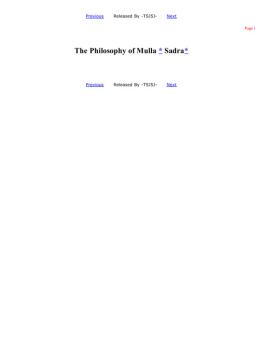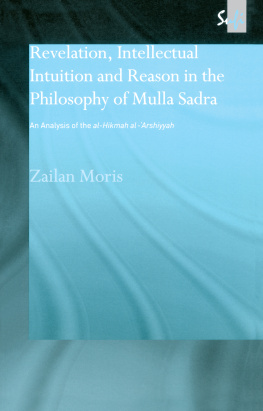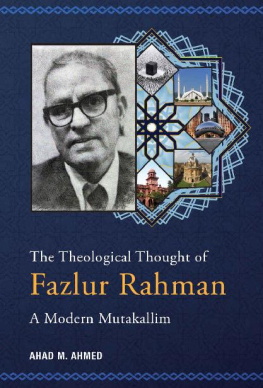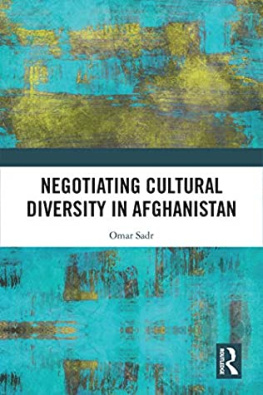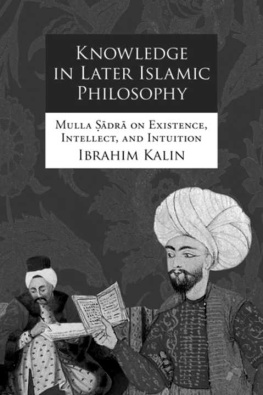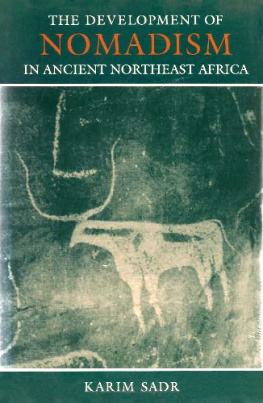Fazlur Raḥmān - The philosophy of Mullā Ṣadrā (Ṣadr al-Dīn al-Shīrāzī)
Here you can read online Fazlur Raḥmān - The philosophy of Mullā Ṣadrā (Ṣadr al-Dīn al-Shīrāzī) full text of the book (entire story) in english for free. Download pdf and epub, get meaning, cover and reviews about this ebook. year: 1975, publisher: SUNY Press, genre: Science. Description of the work, (preface) as well as reviews are available. Best literature library LitArk.com created for fans of good reading and offers a wide selection of genres:
Romance novel
Science fiction
Adventure
Detective
Science
History
Home and family
Prose
Art
Politics
Computer
Non-fiction
Religion
Business
Children
Humor
Choose a favorite category and find really read worthwhile books. Enjoy immersion in the world of imagination, feel the emotions of the characters or learn something new for yourself, make an fascinating discovery.
- Book:The philosophy of Mullā Ṣadrā (Ṣadr al-Dīn al-Shīrāzī)
- Author:
- Publisher:SUNY Press
- Genre:
- Year:1975
- Rating:4 / 5
- Favourites:Add to favourites
- Your mark:
- 80
- 1
- 2
- 3
- 4
- 5
The philosophy of Mullā Ṣadrā (Ṣadr al-Dīn al-Shīrāzī): summary, description and annotation
We offer to read an annotation, description, summary or preface (depends on what the author of the book "The philosophy of Mullā Ṣadrā (Ṣadr al-Dīn al-Shīrāzī)" wrote himself). If you haven't found the necessary information about the book — write in the comments, we will try to find it.
The philosophy of Mullā Ṣadrā (Ṣadr al-Dīn al-Shīrāzī) — read online for free the complete book (whole text) full work
Below is the text of the book, divided by pages. System saving the place of the last page read, allows you to conveniently read the book "The philosophy of Mullā Ṣadrā (Ṣadr al-Dīn al-Shīrāzī)" online for free, without having to search again every time where you left off. Put a bookmark, and you can go to the page where you finished reading at any time.
Font size:
Interval:
Bookmark:
Page i
The Philosophy of Mulla * Sadra*

Page ii
STUDIES IN ISLAMIC PHILOSOPHY AND SCIENCE
Published under the auspices of
the Society for the Study of Islamic Philosophy and Science
EDITORIAL BOARD
George F. Hourani, State University
of New York at Buffalo
Muhsin Mahdi, Harvard University
Parviz Morewedge, Baruch College
of City University of New York
Nicholas Rescher, University of Pittsburgh
Ehsan Yar-Shater, Columbia University
Page iii
The Philosophy of Mulla * Sadra*
(Sadr* al-Din* al-Shirazi*)
FAZLUR RAHMAN
State University of New York Press
Albany, 1975


Page iv
The Philosophy of Mulla * Sadra*
First Edition
Published by State University of New York Press
99 Washington Avenue, Albany, New York 12210
1975 State University of New York
All rights reserved
Printed in the United States of America
Library of Congress Cataloging in Publication Data
Rahman, Fazlur, 1919
The philosophy of Mulla* Sadra* (Sadr* al-Din* al-Shira/i*)
(Studies in Islamic philosophy and science)
Includes bibliographical references.
1. Mulla* Sadra*, Muhammad* ibn Ibrahim*, d. 1611.
I. Title. II. Series.
B753.M84R3
181'.07
75-31693
ISBN 0-87395-300-2
ISBN 0-87395-301-0 (microfiche)
Page v
CONTENTS
A. Mulla * Sadra* and the Character of His Philosophy
B. Sadra's* Sources and His Originality
1. General
2. Sadra's* predecessors
3. Evaluation
C. Sadra's* Works and His Influence.
PART I. Ontology
I.The Metaphysics of Existence
A. Existence
B. Controversy with the "Essentialists"
C. Systematic Ambiguity (Tashkik*) of Existence.
D. Tension between Monism and Plualism
II. Essence
III Cause I: Nature of Causation
A. Cause-Effect Relationship
B. Impossibility of Causal Regress
IV. Cause II: God-World Relationship
A. Efficient Cause and Final Cause
B. God-World Relationship
V. Movement, Time, and, World-Order
A. Movement
B. Time
C. World-Order
Part II. Theology
I. God's Nature
A. Proof of God's Existence
Page vi
B. God as pure existence
C. God's Unity
II. God's AttributesI
A. God's Being and Attributes
B. Knowledge
III. God's AttributesII
A. Power and Will
1. A Survey of Alternative Views
2. Sadra's * Criticism of These Views and His Position
3. Relationship of God's Will to man
4. Doctrines of Bada'* (change of Mind in God), Naskh
(Abrogation of Laws) and Taraddud (reluctant decision).
B. Divine Speech and Revelation
Part III. Psychology: Man and His Destiny
I. Nature of the Soul
II. Theory of KnowledgeI
A. General Considerations
B. The Problem of "Mental Existence (al-wujud* al-dhihni*)"
III. Theory of KnowledgeII: Perception and Imagination
A. External Sense
B. Internal Sense: Imagination and Wahm
IV. Theory of KnowledgeIII: The Intellect
A. Introduction
B. The Problem of Abstraction
C. Ibn Sina* on the "Simple Intellect"
D. Identity of the Intellect and the Intelligible
V. Eschatology
A. Impossibility of Transmigration
B. Proofs of an Afterlife
C. The Nature of Afterlife
Subject Index
Index of Proper Names
Page vii
PREFACE
The present work aims at a critical and analytical statement of the Philosophy of Sadr * al-Din* al-Shirazi* known as Multa* Sadra* (d. 1641), primarily contained in his monumental work al-Asfar* al-Arba'a. As the following pages show, Sadra's* system, despite certain inner difficulties, is a highly original one revealing the extraordinary intellectual calibre of its author. Besides introducing Sadra's* thought to the modern reader, the work, it is hoped, will fully expose the mythical character of the belief, generally prevalent in Western Islamic scholarship, that Islamic Philosophy "died" after al-Ghazali's* attack upon it in the eleventh century.
Indeed, considerable valuable work has been done during the past two and a half decades in the field of post-Ghazali*
Islamic thought, notably on al-Suhrawardi* (d. 1191), the founder of the Illuminationist School. But most leading scholars in this activity, have, through their own spiritual proclivities, been led to emphasize the Sufi and esoteric side of this literature at the cost, as I believe, of its purely intellectual and philosophical hard core, which is of immense value and interest to the modern student of philosophy. I have tried to clarify this in the Introduction to the present work with reference to Sadra* who is hardly esoteric or Sufi, although he does emphasize intellectual intuition vis--
vis purely logical reasoning. It is hoped, therefore, that the present work will further stimulate sorely needed philosophic research into this hitherto little explored but rich field of Islamic thought.
I warmly thank the officers of the Society for the Study of Islamic Philosophy and Science (SSIPS) for having this book published and the State University of New York Press, particularly its director, Norman Mangouni, for publishing it. My grateful thanks are also due to Professor Alford Welch of the Department of Religion, of Michigan State University, who kindly devoted his valuable time not only to reading the proofs but to preparing indices of this work.
FAZLUR RAHMAN
Chicago
Page 1
Factual information about the life of Mulla* Sadra* is extremely scarce. He was born in Shiraz* to a certain Ibrahim*
ibn Yahya* at an unnamed date, came to Isfahan at a young age, and studied with the theologian Baha'* al-Din* al
mili* (d. 1031 A.H./1622 A.C.) and to an extent with the Peripatetic philosopher Mir* Fendereski* (d. 1050
A.H./1641 A.C.), but his principal teacher was the philosopher-theologian Muhammad* known as Mir* Damad* (d.
1041 A.H./1631 A.C.). Mir* Damad* appears certainly to have been a thinker of eminence and originality, but there is no modern scholarly study of him as yet. It seems that when our philosopher (named Muhammad*, titled Sadr* al-Din*, and generally known as Mulla* Sadra* or simply Sadra*) appeared, philosophy, as it was generally taught, was the Peripatetic-neo-Platonic tradition of Ibn Sina* and his followers. During the 6th/12th century, al-Suhrawardi* had criticized some of the basic doctrines of Peripatetism and laid the foundations of the mystic Philosophy of Illumination (Hikmat* al-Ishraq*) which subsequently found several followers. In the Peripatetic tradition itself, the important thirteenth century philosopher, scientist, and Shite* theologian Nasir* al-Din* al-Tusi* was influenced by certain views of the Illuminationist philosopher, although the exact extent and nature of this influence still needs to be closely determined. These Illuminationist injections into the Peripatetic tradition chiefly concern the Ishraqi* attack on Ibn Sina's* conception of God's knowledge as forms or accidents inhering in God's mind but later grew in other directions as wellthe most important being the view that existence is an unreal mental concept to which nothing corresponds in external reality. Mir* Damad* himself, for example, held the latter doctrine. For the rest, however, there is little evidence of the existence of any important Ishraqi* school of thought at the time of the appearance of Mulla* Sadra*. Nor is there any palpable evidence for the existence of a scholarly Staff tradition immediately before Mulla* Sadra*, although certain Sufi claims and clichs had become common due to the infusion of Sufi ideas into philosophy and, even more importantly, due to the permeation of Sufi
Next pageFont size:
Interval:
Bookmark:
Similar books «The philosophy of Mullā Ṣadrā (Ṣadr al-Dīn al-Shīrāzī)»
Look at similar books to The philosophy of Mullā Ṣadrā (Ṣadr al-Dīn al-Shīrāzī). We have selected literature similar in name and meaning in the hope of providing readers with more options to find new, interesting, not yet read works.
Discussion, reviews of the book The philosophy of Mullā Ṣadrā (Ṣadr al-Dīn al-Shīrāzī) and just readers' own opinions. Leave your comments, write what you think about the work, its meaning or the main characters. Specify what exactly you liked and what you didn't like, and why you think so.

